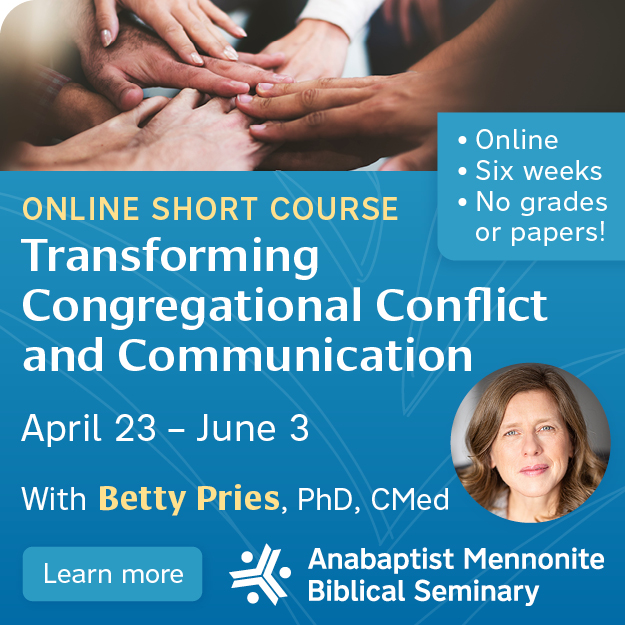Thanks offered for ‘defunding police’ feature
Re: “Defund the police?” feature, Sept. 27, 2021, page 4.
Grateful to Aaron Epp and Canadian Mennonite for taking up this conversation, for featuring Bronwyn Dobchuk-Land’s critical framing alongside reflections on how abolition overlaps with Anabaptism from David Driedger, Michael Pahl and Daniel Friesen, among others.
—Jonathan Dyck (Twitter response)
Reader thankful for MC Canada leaders’ stand against vaccine exemptions
Re: “No religious exemptions from COVID-19 vaccines: MC Canada” letter, Oct. 25, 2021, page 7.
I am writing to commend and thank the Mennonite Church Canada executive ministers for their clear and courageous statement on the need for those who claim to be part of the Christian community, to get vaccinated, in keeping with Christ’s command to love our neighbours. The prevalence of strident “anti-vaxxers” in Christian communities in many parts of Canada is embarrassing, to say the least, and harmful to the Christian witness.
—John Konrad, Abbotsford, B.C.
Social workers lauded for their efforts in Saskatchewan
Re: “Making the best of a bad situation,” Oct. 25, 2021, page 26.
This was a timely article on the Driedgers’ work in child welfare in Saskatchewan.
They were influential in training social workers and leaders in that department. They dealt with the challenges of abused/neglected/abandoned children. I appreciated their committed approach to the care of children and to providing permanent homes for children when parents were unable or unwilling to care for their children.
Children who face poverty, parental alcoholism and the lack of safety, whether Indigenous or not, need protection and some security. Many Mennonite families provided excellent foster care for these children during the so-called “Sixties Scoop” era; there were no other options.
Today, agencies and foster families are criticized for removing these children. This revisionist view of history, without paying attention to the historical context, is flawed.
What do you do when the police call, saying they have young children abandoned in a car with the parents’ whereabouts unknown? You start calling relatives to see if someone can take the children until the parents are located. If no one is able to care for the children, and foster care is needed, this usually initiates a series of court actions.
Otto and Florence deserve to be commended for their contribution to the social-work field, and their work in the church, locally and internationally.
—Henry Neufeld, Delta, B.C.
The letter writer was a social worker in Saskatchewan for a few years and knew both Otto and Florence Driedger.
Natural law must balance church justice policies
Re: “Victim or perpetrator: What am I?” Nov. 22, 2021, page 12.
While I don’t have the answer to Marlene Epp’s question, “What am I?” I do have sympathy for the struggle she describes.
I am especially taken by her reference to Martha Nussbaum’s explanation of the difficulties of finding justice and dignity when complicated by the shame and stigma useful to a social movement.
If today’s church policy is not to make the same mistakes as past policies, minds more capable than mine are needed to disentangle stigma and shame from the process of establishing justice and dignity. I never learned about natural law in seminary, and I expect that it is still not part of seminary or graduate theological education.
Perhaps it’s time to ask those who have been schooled in the concept to offer leadership. If not, then the pendulum of response will continue to swing and knock aside folks at either end.
I concur with Epp that review and revision of these policies are needful, the sooner the better.
—Ed Janzen, New Hamburg, Ont.
Decision-makers called to be accountable to the community
Re: “Victim or perpetrator: What am I?” Nov. 22, 2021, page 12.
Marlene Epp’s response to the public judgment of her late father, Frank Epp, raises concerns about transparency and who gets to control information.
Decision-makers in controversial cases are frequently under pressure publicly and behind the scenes to favour various outcomes. That is why lawyers like to say that justice must not only be done, it should be seen to be done. The point is that decision-makers who wield power over people’s lives should be accountable to the community they serve for the basis of their decisions.
Mennonites, who prefer to locate authority in the community rather than individuals, can resonate with this legal principle. Practically, such accountability will only happen if all the relevant facts supporting a decision are publicly available. That is why in Canada almost every trial, no matter how sensitive, is open to the public.
As a journalistic organization, Canadian Mennonite has a special role to play, maybe even a calling, to make visible the workings of Mennonite judgments. This calling can be advanced by:
- Publishing information like this article online so that it is more accessible to the growing number of people who do not read the paper copy of the magazine.
- Ensuring the article is referenced in the table of contents so that readers will notice there is an item of interest.
- Dedicating an editorial to journalistic ethics, explaining why it is in the public interest to publish sensitive information even if it is painful for people involved.
- Engaging in investigative reporting to make available information the community needs to evaluate judicial-type decisions by Mennonite institutions.
Epp’s experience reminds us, once again, that transparency—and publicity—is essential to good judgment.
—Russel Snyder-Penner, Waterloo, Ont.
The writer is a lawyer based in Kitchener, Ont.
Does Jesus’ parable apply to church—or just the world?
Re: “What if we stayed together?” feature, Dec. 6, 2021, page 4.
Should we be applying the parable of the wheat and the tares to the issue of church splits?
In light of Jesus’ explanation of this particular parable in Matthew 13:36-43, it does not appear to be correctly applied to the church because Jesus interprets the field as “the world.”
Why this is so important is because the church would be rendered powerless to separate from false teachers or the immoral if “the field” means “the church.”
If I’m missing something, I’d like to hear about it.
—Elaine Fehr (online comment)
Advocates sought for arsenic mitigation in Bangladesh
I’m a Mennnonite Central Committee (MCC) Bangladesh alumnus, concerned about where I worked in southern Bangladesh.
Severe arsenic contamination of the shallow groundwater is causing approximately 43,000 Bangladeshi deaths per year, and causing cancers, heart and lung problems, and cognitive disorders, among others.
In the 1970s, various organizations, including MCC, assisted in conversion from surface water—often contaminated with deadly diarrheal diseases—to presumably safer ground water for drinking and irrigation, not realizing the arsenic contamination. MCC had a small arsenic mitigation program but quit after leaving the south in 2008. That area and adjacent area have the highest arsenic concentrations in Bangladesh.
South Bangladesh is very vulnerable to climate change, being near sea level. Stronger storm surges already drive salt water further inland, producing saline soils that are difficult to farm. This problem will only worsen.
MCC rightfully says it can’t do everything, but the right question is: “Why did southern Bangladesh become such a low priority?” These concerns align with MCC priorities.
On page 9 of MCC’s fall 2020 A Common Place magazine, it states: “MCC and its partners continue. . . helping farmers adapt to climate change; ensuring access to safe, clean water; increasing the quality of education and training . . . .”
Small organizations can help. There’s much related research, but the real need is for extension, education and assistance in helping the poor adapt.
Although MCC worked in Bangladesh for 50 years, 37 in the south, it has published very little about these problems, so few constituents are aware. I’ve created a website (www.arsenicbangladesh.com/) detailing more about Bangladesh’s situation.
Advocates are needed now.
—Bill Schumacher, Columbus, Ohio









Leave a Reply
You must be logged in to post a comment.